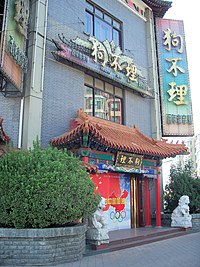Goubuli
| Chinese | 狗不理 | ||||||||||||||||||||||||||||||||||||||||||||||||||
|---|---|---|---|---|---|---|---|---|---|---|---|---|---|---|---|---|---|---|---|---|---|---|---|---|---|---|---|---|---|---|---|---|---|---|---|---|---|---|---|---|---|---|---|---|---|---|---|---|---|---|---|
| Literal meaning | dogs don’t pay attention/ignore | ||||||||||||||||||||||||||||||||||||||||||||||||||
| |||||||||||||||||||||||||||||||||||||||||||||||||||


Goubuli, also sometimes transcribed as Go Believe (Chinese: 狗不理; pinyin: Gǒubùlǐ; lit. 'dogs don't pay attention/dogs ignore'), is a brand of stuffed baozi from Tianjin, China.[1] Founded in 1858, it is one of China's longest established brands.[1] Each Goubuli bun has eighteen wrinkles.[2]
Etymology
There are many explanations for the name Goubuli. The oft-quoted one relates to a poor village boy nicknamed Gouzhai. At 14, he became an apprentice at a food store. Thereafter, he set up his own shop specialising in selling steamed, stuffed baozi. His supposedly very delicious baozi soon gained immense popularity in a short period of time. As a result, Gouzhai became too preoccupied with his business to converse with his customers; so they started to complain, "Gouzhai does not talk to people" (which loosely translates as Chinese: 狗不理; pinyin: Gǒubùlǐ).[2]
In another similar story, there was a boy named Gao Guiyou who had a terrible attitude and could ignore people for days if he was angered. Thus, he was named by his mother Goubuli (his nickname "Gou" with "Buli" meaning "ignores"). At 14, Gou was sent by his father to Tianjin where he gained apprenticeship at a food shop and, after mastering his skills, set up his own shop named "Goubuli". Goubuli buns soon become popular with the Tianjin locals.[3]
English translation
In 2008, in anticipation of the 2008 Summer Olympics which were to be held in Beijing, Goubuli decided to adopt an English name, "Go Believe", in hope of better name recognition by foreign guests. However, this was met with heavy criticism by Chinese netizens.[2]
As of 2005[update], the Goubuli brand is owned by the Chinese pharmaceutical company Tong Ren Tang.
Recognition
Goubuli buns were among the 396 food items awarded the "Famous Chinese Snack" title by the China Cuisine Association in 1997.[2]
Gallery
-
 A traditional Tianjin lunch of Goubuli Baozi
A traditional Tianjin lunch of Goubuli Baozi - Goubuli buns being cooked
- Goubuli bun, ready to eat
-
 Goubuli buns
Goubuli buns
See also
References
- ^ a b Tianjin Time Honored Snack Go Believe, Goubuli Steamed Bun 天津老字号—"狗不理"包子, retrieved 2022-12-05
- ^ a b c d "Bun producer adopts English name 'go believe'". China Daily. February 25, 2008. Retrieved December 8, 2012.
- ^ “狗不理”包子的由来(图) (in Chinese). Xinhua. June 15, 2004. Archived from the original on July 10, 2004. Retrieved December 8, 2012.
External links

- Official website















